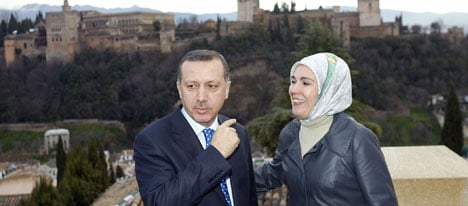
Both Turkey’s Prime Minister and CARLOS PRANGER believe Granada symbolises harmonious co-existence between different cultures. However, the latter is not as confident as the former that the Alliance of Civilisations will be a success
MUTUAL suspicion, fear and misunderstanding between Arab-Islamic and Western societies have been growing since the end of the 20th century. This is mainly due to immigration and Western interventions in the Middle East (Palestine, Afghanistan and Iraq).
The difficult coexistence between these groups with different religions and education has been used by extremists to justify violent acts of terrorism, such as September 11 in New York or March 11 in Madrid.
In the 59th General Assembly of the United Nations on September 21, 2004, Spain President José Luis Rodríguez Zapatero proposed an initiative called the Alliance of Civilizations.
Having just brought back Spanish troops from Iraq, Zapatero’s speech at the UN proposed an alliance between the West and the Arab-Islamic world to fight international terrorism without resorting to military intervention – an alternative to other positions held by neo-conservatives such as Samuel Huntington (theorist of the Clash of Civilizations) or George Bush, who are intent on ‘imposing’ democracies, such as in Iraq and Afghanistan.
Zapatero’s initiative was backed by Turkey’s Prime Minister, Recep Tayyip Erdogan. The aim of the project was to produce recommendations of a concrete course of action for UN member states to adopt.
To fulfil this objective, the UN created a High-level Group consisting of 20 eminent persons drawn from politics, culture, civil society, media and religious leadership. Among its members were former Iranian President Mohammad Khatami and Archbishop Desmond Tutu, the South African Nobel Laureate.
The Alliance of Civilisations holds that it is possible to reach common ground among diverse ethnic and religious groups, based on the tolerance, understanding and respect of the fundamental values and beliefs of each group.
In this way, and attempting to suppress “extremism,” a coalition will be created to work for a peaceful coexistence between diverse groups and sustain international stability.
The Alliance of Civilizations is expected to be voted into action by the end of 2009, and may initially be implemented in the Middle East in conjunction with the framework of the EU European Neighbour Police.
In theory, this sounds good. But the initiative has also had its critics. It is very difficult to define clearly what a civilization is and it can also end up being a subject of political correctness, a way to avoid confronting problems and supporting moral relativism, which asks for respect for all cultures, even though these cultures sometimes attack human rights.
On January 15, 2008, Zapatero inaugurated the First Forum of the Alliance of Civilizations in Madrid. Before reaching the Spanish capital, Turkish PM Erdogan had visited Granada. This was barely a fortnight after La Toma, the commemoration of the expulsion of the Moors by the Catholic Monarchs in 1492 (see the Olive Press, issue 39, ¡Toma Ya!).
Granada’s history has been one of the best examples of Spain’s melting pot of three religions: Christian, Jewish and Muslim. It seems that the Turkish leader’s visit to the city was a great success. “Granada is a great example of the Alliance of Civilizations,” Erdogan said after visiting the Alhambra and the Capilla Real, where those liberating majesties Isabel and Ferdinand lie.
Granada is a prime reference because of the number of different peoples who have inhabited the city throughout history, sometimes respectful to each other, sometimes immersed in the bloodiest of confrontations.
For Erdogan, respect towards ideas and people is fundamental for the prevention of terrorism and conflicts among different civilizations. “The Alliance of Civilisations is the most effective medicine against terrorism, not only a national but international problem,” he said in the presence of the Partido Popular mayor of Granada, José Torres Hurtado.
The mayor gave Erdogan the key to the city, while talking of Granada as a city of different and integrated cultures. A few days before however, the mayor had participated in La Toma while anti-constitutional flags appeared and racist insults were shouted against Muslims in the Plaza del Carmen.
Is that a good example of alliance?
Zapatero states that Spain is “a country of peace that defends cultural diversity, respects all civilisations and shelters all religions. A country that knows, due to its historical experience, that diversity is a source of richness.” These words mean well, but the forum in Madrid has been a bit decaffeinated. The project suffers from a lack of real definition and political support. Its power to attract firm ideas and enthusiastic supporters has not been outstanding.
At the moment, the Alliance of Civilisations is a bag of good intentions. It has not yet proved efficient in solving real problems.
In a world of globalization characterised by diversity, trying to bring different cultures together is a very ambitious task – especially after recent terror atrocities. The basic idea of this alliance is to fight extremism not only through military means, but by working on its causes. Education, immigration, media, the internet and trade all seem fundamental and have to be worked on. But, will the Alliance of Civilisations turn into another office within the UN headquarters in New York, or will it become an entity with real power?
Only time will tell.







